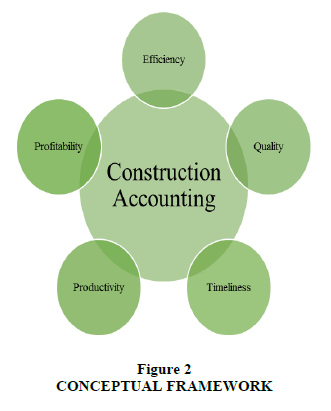Construction Accounting: How to Maintain Accurate Records and Improve Cash Flow
Construction Accounting: How to Maintain Accurate Records and Improve Cash Flow
Blog Article
Recognizing the Significance of Building And Construction Accountancy for Successful Task Management

Role of Building Audit
Building accountancy functions as the backbone of financial administration in the building and construction industry, ensuring that jobs are finished within budget and financial goals are fulfilled. construction accounting. This specialized accounting strategy addresses the special obstacles faced in construction projects, including varying job periods, changing prices, and numerous stakeholders
Among the key duties of building bookkeeping is to offer exact price estimation and monitoring throughout the project lifecycle. This assists in informed decision-making, enabling project managers to change timelines and resources efficiently. In addition, construction audit boosts cash money flow monitoring by keeping an eye on accounts payable and receivable, therefore guaranteeing that funds are offered for timely settlements to providers and subcontractors.
Furthermore, building and construction accounting help in conformity with industry laws and reporting needs. It equips project managers with the necessary economic information to prepare thorough monetary statements, which are essential for audits and financial testimonials. By maintaining clear documents, construction accounting cultivates transparency and liability, essential parts in building trust fund among stakeholders. Ultimately, the function of building and construction accounting extends beyond mere monetary monitoring; it is integral to critical preparation and functional efficiency, driving the success of building and construction tasks in an affordable landscape.
Secret Parts of Building And Construction Audit

Budgeting establishes an economic structure that overviews job implementation, permitting managers to allot resources successfully and anticipate possible financial obstacles. Exact price monitoring is vital for tracking costs in real-time, assisting to identify variations in between forecasted and real costs. This enables prompt changes to maintain the job on budget.
Furthermore, financial reporting provides stakeholders with a clear photo of the project's monetary health and wellness. Normal reports, such as earnings and loss declarations and cash money circulation evaluations, assist in educated decision-making and improve transparency among all parties involved.
In addition, conformity with sector laws and accounting requirements is vital. This makes certain that financial methods are not just reliable however likewise lawful, safeguarding the company against legal effects. By integrating these crucial parts, building and construction bookkeeping cultivates a structured strategy to handling funds, ultimately adding to the successful conclusion of building and construction jobs.
Advantages for Job Managers
Leveraging effective building and construction accounting methods offers job supervisors with a multitude of benefits that improve both functional performance and economic oversight. One significant advantage is enhanced budget plan administration. Exact monitoring of earnings and costs enables task managers to keep track of economic efficiency in actual time, ensuring projects remain within budget and helping with timely modifications when needed.
Moreover, building and construction audit simplifies capital monitoring, making it possible for task supervisors to maximize and prepare for monetary requirements resource appropriation. By understanding cash money inflows and discharges, they can better manage settlements to suppliers, subcontractors, and employees, thus avoiding expensive delays.
In addition, robust accounting systems give detailed reporting capacities. Project managers can create reports that provide insights right into job profitability, price variations, and resource use. This data-driven strategy promotes informed decision-making, enabling supervisors to identify possible issues proactively and carry out corrective procedures.
Lastly, adherence to building audit requirements makes certain compliance with regulatory and legal needs, minimizing the danger of fines or disputes. On the whole, effective building accountancy equips project managers with the devices required to drive job success, boost stakeholder self-confidence, and promote long-term organizational growth.
Typical Obstacles in Building And Construction Accountancy
Several task supervisors encounter significant difficulties in building accountancy that can impede job success. Among the key challenges is the complexity of tracking multiple task sites, each with unique budget plans, timelines, and resource allowances. This needs meticulous interest to detail, which can be overwhelming without a robust accounting system in position.
Additionally, varying material prices and labor prices can make complex budget plan administration, making accurate projecting hard. Job managers typically struggle to reconcile these prices with real expenditures, leading to possible monetary discrepancies.
Moreover, building and construction audit includes compliance with numerous guidelines, consisting of tax obligations and labor laws. Browsing these guidelines can be difficult, particularly for supervisors who might not have a strong audit background.
Another considerable challenge is taking care of capital, which is important in the building and construction industry. Hold-ups in invoicing, repayments from customers, or unanticipated task modifications can produce money circulation lacks, endangering the task's development.
Last but not least, effective interaction between job supervisors, accountants, and field groups is vital. Misconceptions can cause incorrect economic coverage, even more making complex task management efforts. Resolving these challenges proactively is necessary for effective construction bookkeeping.

Ideal Practices for Effective Audit
While navigating the intricacies of building accountancy can be challenging, taking on finest practices can significantly improve financial monitoring and project success. One basic practice is preserving accurate and timely documents. Implementing robust audit software program tailored to construction jobs can streamline data access, invoicing, and reporting, saving and minimizing mistakes time.
Additionally, developing a clear spending plan and regular tracking versus this spending plan are essential. Utilizing a system of recommended you read routine financial reviews enables task supervisors to identify variances early, helping with prompt decision-making. It is also important to different task costs into indirect and direct classifications, allowing more clear understandings right into productivity.
An additional ideal practice involves fostering open communication among all stakeholders. Regular updates and collaborative discussions about economic standing can make certain every person is straightened and educated. Educating team in construction-specific accountancy concepts additionally improves proficiency and accuracy.
Lastly, guaranteeing compliance with relevant audit criteria and laws is non-negotiable. Regular audits and interior evaluations add to openness and responsibility, building have a peek at these guys count on with customers and stakeholders. By concentrating on these best techniques, building and construction companies can enhance their bookkeeping procedures, inevitably driving job success and financial security.
Final Thought
In conclusion, construction audit plays an essential function in ensuring effective project monitoring by assisting in accurate economic oversight and enhancing decision-making. By incorporating essential parts such as expense estimation, money flow monitoring, and compliance, job managers can browse common difficulties and utilize finest techniques for effective accountancy. Ultimately, a robust building and construction bookkeeping structure not only safeguards budget plan honesty but additionally adds to the general economic health of building tasks, fostering lasting success within the market.
By integrating these key elements, construction accounting cultivates an organized strategy to managing monetary sources, inevitably contributing to the successful completion of building tasks.
Exact tracking of expenses and incomes enables task managers to keep track of monetary performance in genuine time, making sure tasks continue to be within budget and facilitating timely adjustments when required.
Job managers can generate reports that provide insights into project profitability, cost variances, and resource utilization.Many task supervisors run into considerable difficulties in building bookkeeping that can hinder project success. construction accounting. Ultimately, a durable building and construction audit structure not only safeguards find out this here budget integrity yet additionally adds to the general financial health and wellness of building and construction projects, fostering lasting success within the industry
Report this page